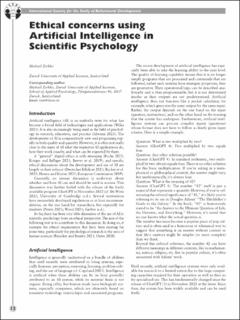Please use this identifier to cite or link to this item:
https://doi.org/10.21256/zhaw-29603| Publication type: | Article in scientific journal |
| Type of review: | Editorial review |
| Title: | Ethical concerns using artificial intelligence in scientific psychology |
| Authors: | Zirkler, Michael |
| et. al: | No |
| DOI: | 10.21256/zhaw-29603 |
| Published in: | ISSBD Bulletin |
| Volume(Issue): | 84 |
| Issue: | 2 |
| Page(s): | 12 |
| Pages to: | 15 |
| Issue Date: | Nov-2023 |
| Publisher / Ed. Institution: | Sage |
| ISSN: | 2040-5235 2040-5243 |
| Language: | English |
| Subjects: | Digitalisierung; Artificial Intelligence (AI); Scientific Psycholgy; Ethics |
| Subject (DDC): | 006: Special computer methods 150: Psychology |
| Abstract: | Artificial intelligence (AI) is an umbrella term for what has become a broad field of technologies and applications (Wilks 2023). It is also increasingly being used in the field of psychology in research, education, and practice (Abrams 2021). The development of AI is comparatively new and progressing rapidly in both quality and quantity. However, it is often not really clear to the users of AI what the respective AI applications do, how they work exactly, and what can be expected by them. A "general" digital ethics is only emerging (Fuchs 2023; Krieger and Belliger 2021; Beever et al. 2019), and specific ethical discussions about the development and use of AI are largely in their infancy (Deutscher Ethikrat 2023; Becker et al. 2022; Hanna and Kazim 2021; European Commission 2019). Currently, an intense discussion is underway about whether and how AI can and should be used in science. This discussion was further fueled with the release of the freely available program ChatGPT in November 2022 (cf. De Witte 2023; University of Cambridge n.d.). Several institutions have meanwhile developed regulations or at least recommendations, on the one hand for researchers, but especially for students (Peters 2023; Wood 2023; Garber n.d.). So far, there has been very little discussion of the use of AI in scientific psychology from an ethical perspective. The aim of the following text is to contribute to this discussion. In doing so, it exempts the ethical requirements that have been existing for some time, particularly for psychological research in the area of human sciences (Panicker and Stanley 2021; Oates 2020). |
| URI: | https://digitalcollection.zhaw.ch/handle/11475/29603 |
| Fulltext version: | Published version |
| License (according to publishing contract): | Licence according to publishing contract |
| Departement: | Applied Psychology |
| Organisational Unit: | Psychological Institute (PI) |
| Appears in collections: | Publikationen Angewandte Psychologie |
Files in This Item:
| File | Description | Size | Format | |
|---|---|---|---|---|
| 2023_Zirkler_Ethical-concerns-using-artifical-intelligence_ ISSBD-Bulletin.pdf | 439.32 kB | Adobe PDF |  View/Open |
Show full item record
Zirkler, M. (2023). Ethical concerns using artificial intelligence in scientific psychology. ISSBD Bulletin, 84(2), 12–15. https://doi.org/10.21256/zhaw-29603
Zirkler, M. (2023) ‘Ethical concerns using artificial intelligence in scientific psychology’, ISSBD Bulletin, 84(2), pp. 12–15. Available at: https://doi.org/10.21256/zhaw-29603.
M. Zirkler, “Ethical concerns using artificial intelligence in scientific psychology,” ISSBD Bulletin, vol. 84, no. 2, pp. 12–15, Nov. 2023, doi: 10.21256/zhaw-29603.
ZIRKLER, Michael, 2023. Ethical concerns using artificial intelligence in scientific psychology. ISSBD Bulletin. November 2023. Bd. 84, Nr. 2, S. 12–15. DOI 10.21256/zhaw-29603
Zirkler, Michael. 2023. “Ethical Concerns Using Artificial Intelligence in Scientific Psychology.” ISSBD Bulletin 84 (2): 12–15. https://doi.org/10.21256/zhaw-29603.
Zirkler, Michael. “Ethical Concerns Using Artificial Intelligence in Scientific Psychology.” ISSBD Bulletin, vol. 84, no. 2, Nov. 2023, pp. 12–15, https://doi.org/10.21256/zhaw-29603.
Items in DSpace are protected by copyright, with all rights reserved, unless otherwise indicated.